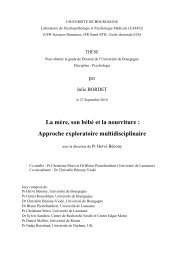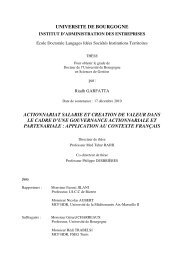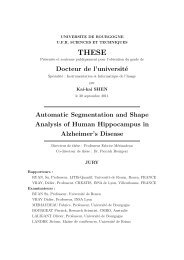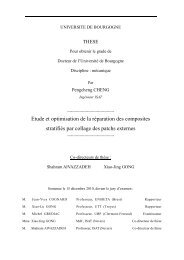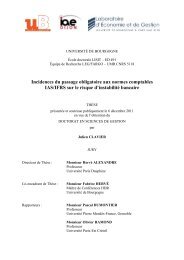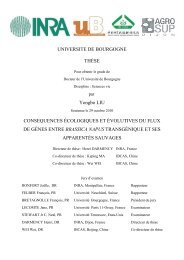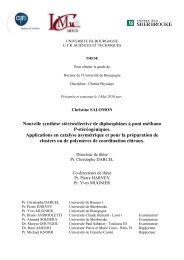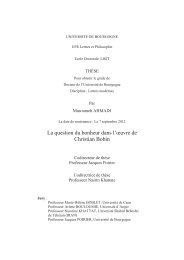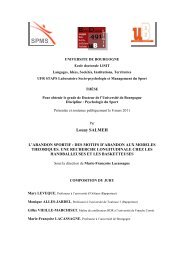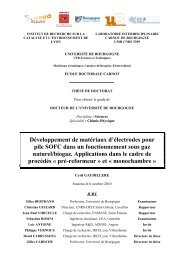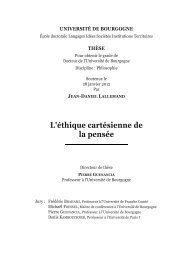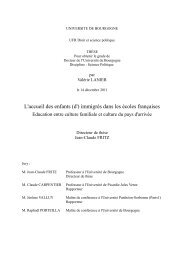Higher education in Asian countries and the role of international ...
Higher education in Asian countries and the role of international ...
Higher education in Asian countries and the role of international ...
Create successful ePaper yourself
Turn your PDF publications into a flip-book with our unique Google optimized e-Paper software.
24<br />
capital <strong>the</strong>ory <strong>in</strong> order to study <strong>the</strong> public <strong>and</strong> private benefits <strong>and</strong> returns <strong>of</strong> <strong>education</strong>. Early<br />
research studies found that <strong>education</strong> has no significant contribution to <strong>in</strong>dividual <strong>and</strong> societal<br />
ga<strong>in</strong>s (Friedman & Friedman, 1980). It was believed by <strong>the</strong> <strong>in</strong>ternational development<br />
organizations that primary <strong>and</strong> secondary school<strong>in</strong>g are more important than tertiary <strong>education</strong><br />
for development <strong>and</strong> poverty reduction. S<strong>in</strong>ce <strong>the</strong>se organizations, <strong>in</strong>clud<strong>in</strong>g <strong>the</strong> World Bank,<br />
encouraged relative neglect <strong>of</strong> higher <strong>education</strong> by <strong>the</strong> governments <strong>of</strong> poor <strong>countries</strong> (Bloom,<br />
Cann<strong>in</strong>g, & Chan, 2006). In many <strong>countries</strong>, resources were reallocated from secondary <strong>and</strong><br />
higher <strong>education</strong> to primary <strong>education</strong> that resulted <strong>in</strong> <strong>the</strong> slowdown <strong>of</strong> development <strong>and</strong><br />
expansion <strong>of</strong> higher <strong>education</strong> <strong>in</strong> many low <strong>in</strong>come <strong>countries</strong> (Tilak J. B., 2010).<br />
But, contrary to such early view, recent evidence suggests higher <strong>education</strong> is a determ<strong>in</strong>ant as<br />
well as a result <strong>of</strong> <strong>in</strong>come, <strong>and</strong> can produce public <strong>and</strong> private benefits (Bloom, Hartley, &<br />
Rosovsky, 2006). The low priority given to higher <strong>education</strong>, with<strong>in</strong> development <strong>in</strong>itiatives by<br />
<strong>the</strong> states <strong>and</strong> IGOs, was due to <strong>the</strong> shortage <strong>of</strong> empirical evidence that it affects economic<br />
growth <strong>and</strong> poverty reduction (Tilak, 1994). An analysis or study <strong>of</strong> any phenomenon based on<br />
limited <strong>in</strong>formation with few variables is <strong>in</strong>complete because we do not know with certa<strong>in</strong>ty<br />
o<strong>the</strong>r possible potential variables <strong>and</strong> exact effect <strong>of</strong> each variable <strong>in</strong> specific circumstances.<br />
For <strong>the</strong> last few decades <strong>the</strong> importance <strong>of</strong> higher <strong>education</strong> is well understood <strong>and</strong> recognized<br />
by IGOs, states <strong>and</strong> societies. Nowadays higher <strong>education</strong> <strong>in</strong>stitutions are among <strong>the</strong> key actors<br />
<strong>in</strong> <strong>the</strong> production, preservation, <strong>and</strong> dissem<strong>in</strong>ation <strong>of</strong> knowledge thus higher <strong>education</strong> can <strong>and</strong><br />
do make a significant contribution to regional economic, social <strong>and</strong> cultural development<br />
(Marmolejo & Puukka, 2006). Equally, higher <strong>education</strong> provides well educated skilled human<br />
capital through vocational <strong>education</strong>. This type <strong>of</strong> <strong>education</strong> is <strong>of</strong> great importance <strong>and</strong> it has a<br />
higher dem<strong>and</strong> <strong>in</strong> <strong>the</strong> job market so it results <strong>in</strong> <strong>the</strong> enhanced employability <strong>and</strong> reduced chance<br />
<strong>of</strong> <strong>education</strong>-job mismatch (Giret, 2011).<br />
<strong>Higher</strong> <strong>education</strong> contributes to society <strong>in</strong> many ways: it paves <strong>the</strong> way for <strong>in</strong>dustrialization by<br />
develop<strong>in</strong>g human capital that <strong>in</strong>clude skilled labor, pr<strong>of</strong>essionals, planners <strong>and</strong> scientists; it<br />
promotes knowledge based economy by establish<strong>in</strong>g <strong>in</strong>formation <strong>and</strong> communication<br />
technologies, knowledgeable workers <strong>and</strong> managers with 21 st century skills; it ensures<br />
susta<strong>in</strong>able growth by shap<strong>in</strong>g <strong>and</strong> guid<strong>in</strong>g reform process <strong>and</strong> attitude; it helps <strong>in</strong> <strong>the</strong>



